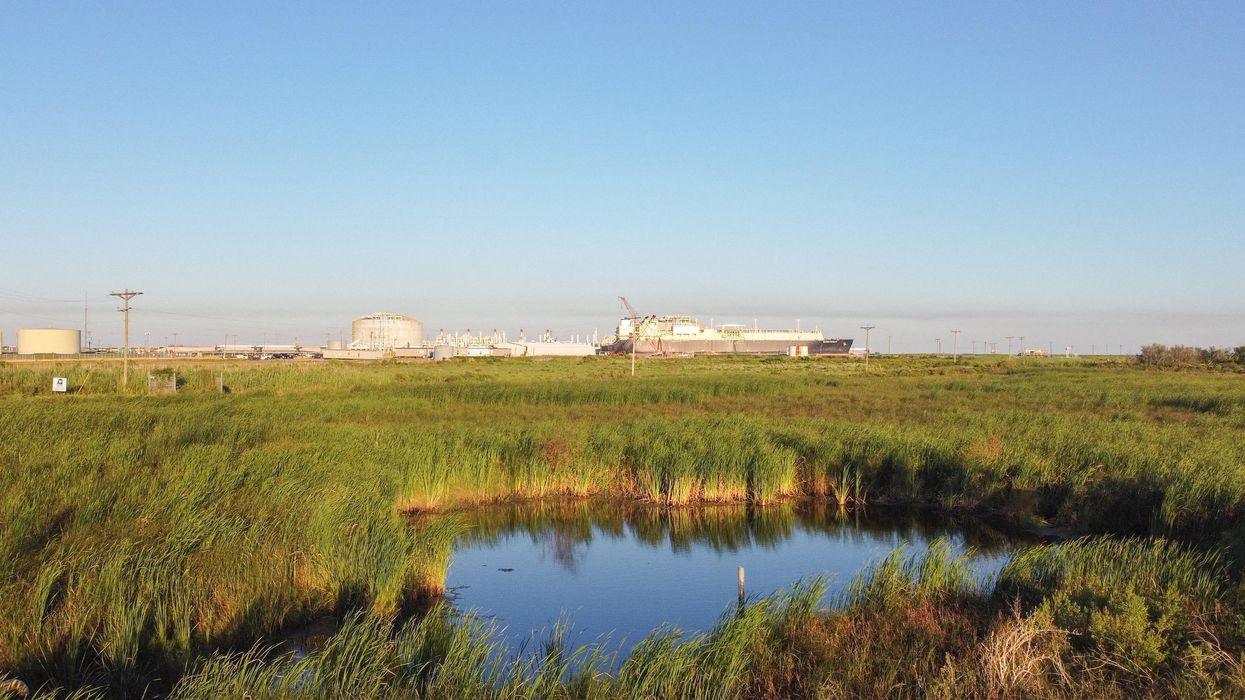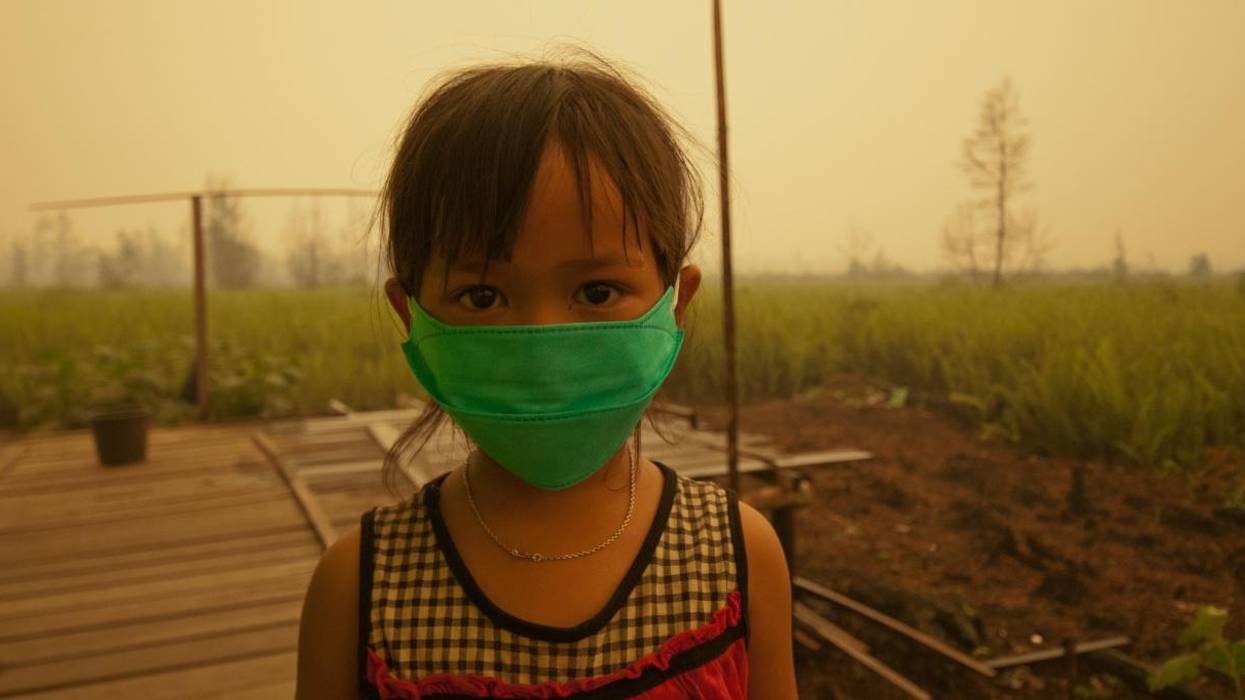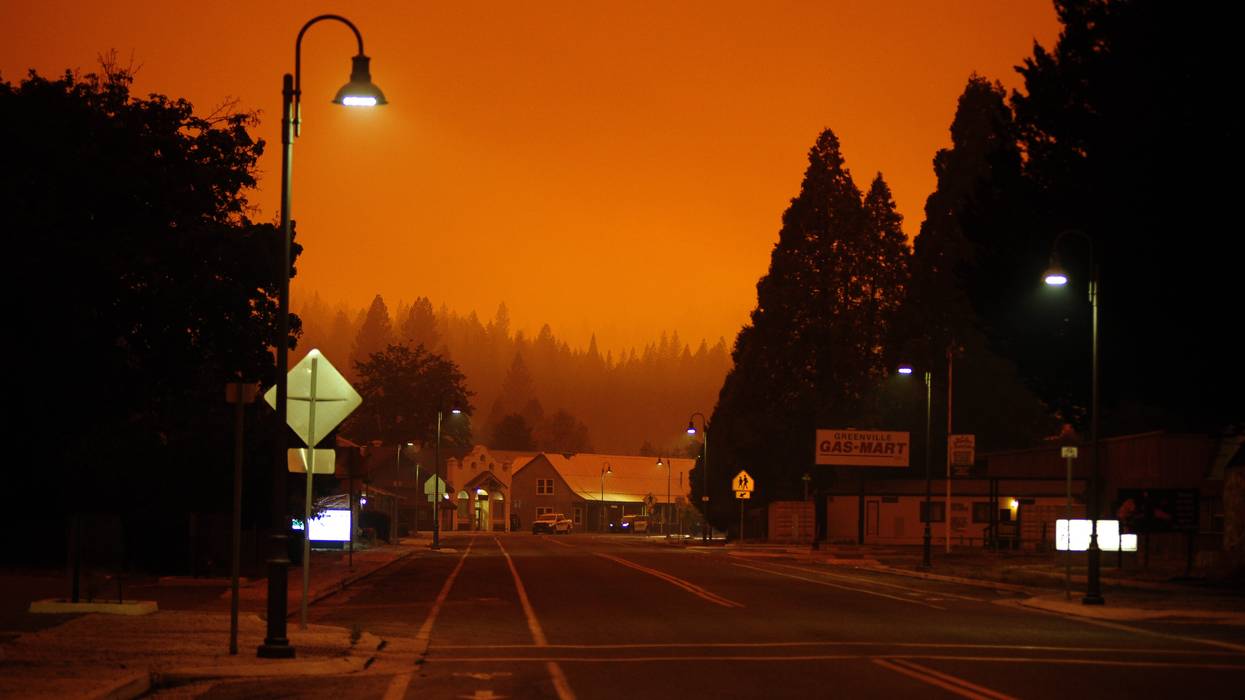'Right Thing to Do': FERC Delays Controversial LNG Export Terminal
"We are happy about the delay, but these projects don't ever need to be approved and neither does any other LNG facility," one frontline advocate said.
Frontline communities along the Gulf Coast were granted a "temporary reprieve" last week when the Federal Energy Regulatory Commission moved to pause its approval of the controversial Calcasieu Pass 2 liquefied natural gas export terminal while it conducts an assessment of its impact on air quality.
FERC approved Venture Global's CP2 in late June despite opposition from local residents who say the company's nearly identical Calcasieu Pass terminal has already wracked up a history of air quality violations and disturbed ecosystems and fishing grounds in Louisiana's Cameron Parish, harming health and livelihoods.
"This order reveals that FERC recognizes that CP2 LNG's environmental impacts are too great to pass through any real scrutiny" Megan Gibson, a senior attorney with the Southern Environmental Law Center (SELC), said in a statement on Monday.
"FERC's pause on construction may give us some temporary reprieve, but this project never should have been authorized in the first place."
FERC's decision follows a request for a rehearing of its June decision filed by frontline residents and community groups including For a Better Bayou and Fishermen Involved in Sustaining Our Heritage (FISH) as well as the Sierra Club and the Natural Resources Defense Council. In their request, the groups and individuals pointed to errors the commission had made in its approval decision.
"With this order, it seems FERC is finally willing to acknowledge that it has not done enough to properly consider the cumulative harm on communities caused by building so many of these LNG export terminals so close together," Nathan Matthews, a Sierra Club senior attorney, said in a statement. "Prohibiting construction of CP2 LNG while FERC takes another look at the environmental impact of this massive, polluting facility is the right thing to do."
"Still," Matthews continued, "FERC must take concrete steps to properly evaluate the true scope of the dangers posed to communities from gas infrastructure moving forward and avoid making unwarranted approvals in the future."
FERC's decision comes over four months after the D.C. Circuit Court remanded the commission's approval of Commonwealth LNG, also in Louisiana, over concerns that it had not fully assessed the impacts of that project's air pollution emissions. Now, frontline advocates are urging FERC to do its due diligence as it weighs the environmental impacts of CP2.
"Through the lenses of optical gas imaging, we've seen massive plumes of toxic emissions, undeniable proof that these projects poison the air we breathe," James Hiatt, director of For a Better Bayou, said of LNG export facilities. "Modeling must use the latest data from the most local sources to fully capture the harm these facilities inflict on Cameron Parish. Anything less is a betrayal of our community. FERC must choose justice over profit and stop sacrificing people for polluters."
Gibson of SELC said that FERC had already repeated some of the errors in its CP2 approval in its new order.
"This continued failure to fulfill its regulatory duty is not just an oversight—it is a failure to protect vulnerable communities and our economy from the real potential harms of this massive export project," Gibson said.
FERC's decision comes as the fate of the LNG buildout itself hangs in the balance. The Biden administration's Department of Energy is currently rushing to complete its renewed assessment of whether or not LNG exports serve the public interest. Environmental and frontline groups have argued that they do not because of local pollution, the fact that they would raise domestic energy bills, and their contribution to the climate emergency. CP2 alone would spew 8,510,099 metric tons of carbon dioxide-equivalent per year, which is about the same as adding 1,850,000 new gas cars to the road.
While President-elect Donald Trump has promised to "drill, baby, drill" and is likely to disregard any Biden administration conclusions, a strong outgoing statement against LNG exports would help bolster legal challenges to Trump energy policy.
At the same time, Bill McKibben pointed out in a column on Tuesday that the administration's pause on LNG export approvals while it updates its public interest criteria has acted to slow the industry's expansion, and that FERC's reconsideration of CP2 could add to this delay.
"The vote for the new review is 4-0, and bipartisan," McKibben wrote. "It could slow down approvals for the project till, perhaps, the third quarter of next year. And that's good news, because the rationale for new LNG exports shrinks with each passing month, as the gap between the price of clean solar, wind, and battery power, and the price of fossil fuel, continues to grow."
Ultimately, frontline Gulf Coast advocates want to see the LNG buildout halted entirely.
"I, along with the fishermen in Cameron, Louisiana, know firsthand how harmful LNG exports are, and see the total disregard they have for human life as they poison our families and seafood," said FISH founder Travis Dardar, an Indigenous fisherman in Cameron, Louisiana. "FERC's pause on construction may give us some temporary reprieve, but this project never should have been authorized in the first place. As far as anyone who believes in the fairytale of LNG being cleaner, we have paid with our communities and livelihoods. It's time to break these chains and turn away from this false solution."
Roisheta Ozaine, a prominent anti-LNG activist and founder of the Vessel Project of Louisiana, said that she, as a mother in an environmental justice community, saw "firsthand how LNG facilities prioritize profit over the well-being of our families. Commonwealth and CP2 are no different."
"We are happy about the delay, but these projects don't ever need to be approved and neither does any other LNG facility," Ozane continued. "My children are suffering from health conditions that threaten their daily lives, all while regulatory agencies and elected officials turn a blind eye. It's time for our leaders to put people before profit and prioritize the health of our communities over the pollution that harms us. We deserve a future where our children's health is safeguarded, not sacrificed."


